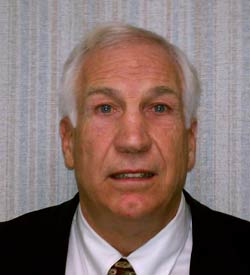Child Abuse Bills Await Governor’s Signature
Under current law teachers are “mandated reporters” of child abuse, but state Senator Pat Vance (R-Cumberland) says only 15% of school districts provide any kind of training to help them recognize it. Vance is the prime sponsor legislation that will require school employees, who have direct contact with children, to receive at least three hours of training in child abuse identification every five years.
“It’s always been important but since the recent publicity coming out of State College it has become even more vitally important,” says Vance, who has introduced this bill before.
The reference to “recent publicity,” of course, refers to the Jerry Sandusky trial. Vance’s bill received unanimous House votes on June 18th (day five of testimony in the child sex abuse trial). The Senate unanimously concurred in House amendments on June 25th (the first session day following Sandusky’s conviction on 48 charges of child sex abuse).

Jerry Sandusky is currently locked up in the Centre County Correctional Facility. He will appeal the conviction.
Also awaiting the governor’s signature is legislation that will allow expert witnesses to put sexual assault victims’ behavior into context at trial. “We have seen how the defendant in the sexual assault case being heard in Centre County was permitted to provide an expert witness to explain the defendant’s behavior but Pennsylvania case law prohibits the prosecution from presenting expert witnesses,” Rep. Cherelle Parker (D-Philadelphia) explained in a June 21st statement. That was also the date the Sandusky jury began its deliberations.
The changes to Pennsylvania’s child abuse statutes may not stop with these two bills. A Task Force on Child Protection was tapped in the wake of the Sandusky grand jury to review the state’s child abuse policies and procedures. The task force’s final report is due by November 30th.











